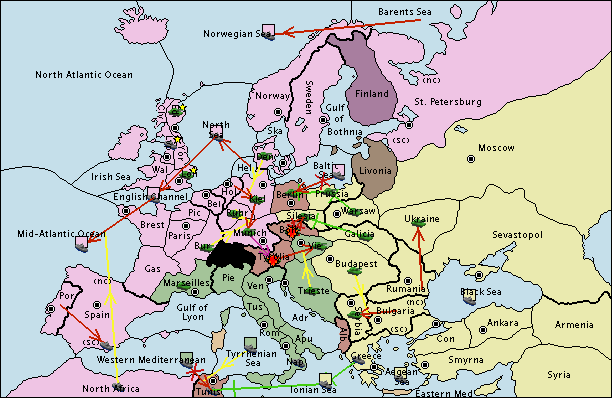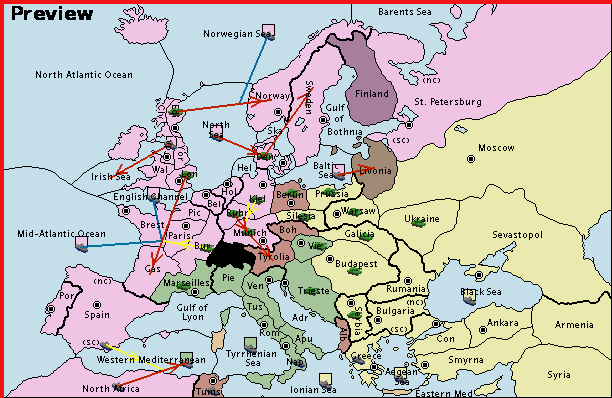Diplomacy: Endgame

The other main topic of this blog is superhero movies...of course I had to make this joke.
I want to note how unusual it is to be facing an endgame situation in 1907, especially considering that the solo-win threat is England. I find that an "endgame" state (which I'll define as a situation where a player is attempting a solo win or a dominant alliance is trying to finish off weaker powers before voting draw) usually arises much later than 1907. Usually "endgame" starts after 1910, sometimes well after 1910 (like 1914 or 1916). English solo win attempts in particular tend to appear after long, grinding matches.
I think normally my matches take so long because I play high-level, invitational, draw-size scoring matches. In those matches, the players choose moves that are much more methodical and conservative. They don't risk everything on their opening moves, don't fully trust players until several turns have passed, and are difficult to bait into positions where they can be backstabbed.
In this match, that is not how my rivals have played. In my opinion, many players in this match have made reckless, risky, and/or overly-trusting moves that made them easy to attack without consequence. As a result, they were attacked and there was little they could do to defend themselves (in my opinion, this is what happened to France, Russia, Germany, and Austria).
Have I seen this unfold because the players here aren't as experienced as the players I usually play against? Is it because sum-of-squares scoring encourages a "go big or go home" strategy that gets players eliminated quickly? Is it because this is a tournament match and the players are desperate to win? Is it because the tournament setting has time-constrained the players and that made them sloppy?
Or perhaps I had a hand in all this. I manipulated other players (Germany, Italy, Turkey, Austria) into helping me crush France and Russia early. I manipulated my targets into moving their units away from me (especially France, Germany, and later Italy -- and Russia to an extent). Perhaps I did this with relative ease due to all the factors I considered in the previous paragraph.
Who can say?
I can say that no power I attacked (so far) lasted more than 3 years. I attacked France and Russia in 1901 and both were eliminated in 1903. I attacked Germany in 1904 and Germany was eliminated in 1906. As of 1906, I've attacked Italy and Austria too. Will Austria last? Will my rivals be able to get it together to stop my solo win attempt?
Alright, let's take a look at the board:

Austria disbanded Bohemia and Tyrolia, as I predicted.
I already planned out my strategy and most of my moves last turn when I was making my build, so there's not a lot for me to say.
It's utterly obvious that I am attempting a solo win, which means I probably can't trick any of the remaining players. All 3 of them are surely committed to a draw at this point. If any of them gives up fighting for the draw, it probably won't be the result of something I say (but it might be a result of infighting).
Maybe a player in my position with more skill than I have would think of something worth saying. But in my experience, a player who is blatantly attempting a solo win (and who is close to it, as I am) needs to focus on making the best tactical choices and hope that the other players make a mistake. I only have so much time per day to spend on this match, and I'd rather spend that time making brilliant tactical choices than on crapshooting with my press.
Sometimes, opportunity knocks. I've played games where I reach endgame like this, and one of the remaining players suddenly messages me "I'll throw you the game, I hate working with so-and-so, I can't stand it" and they really do throw me the game. So I think I'm better off keeping my mouth shut. Anything I say might just arouse anger. In my opinion, keeping quiet in endgame (as the point leader) can be a way to maintain one's esteem with the remaining players. I don't think Austria or Italy would decide to throw the match to me, but they might decide to if I seem dignified and deserving.
I think a lot of players in my position would take Marseilles and then vote draw, believing that a solo win was too unlikely to be worth pursuing. But that's not my attitude. Whenever I attempt a solo win, I keep playing until my rivals successfully create a stalemate line. One of my rivals might make a mistake in trying to create a stalemate line. Because that's always possible, I force my opponents, every match, without exception, to keep playing until they actually assemble a true stalemate position. Sometimes I even press on after that...
Global Messages
Austria: Looks like I'm right behind you, betrayed by the same betrayer.....sometimes you just don't learn the obvious lesson.
Germany: England might yet sneak away with a solo. Here’s to hoping.
Germany: Probably not, though. Too late to make it to Moscow.
Secret Thoughts re: Global
This is just idle chit-chat that I don't need to dignify with a response. The fact that Germany, an eliminated player, is sending messages sort of bothers me. I wish webDiplomacy did not allow eliminated players to send messages before the conclusion of the match.
My Moves

If Austria and Italy listen to Turkey, Turkey probably can tell them how to stop me. But if Italy doesn't listen to Turkey, or Turkey (to my surprise) doesn't know what to do, then maybe I can win.
I have some assumptions:
- I assume Turkey will support-hold Berlin with Prussia and Silesia. I have the ability to make a successful attack on Berlin this turn, but only if Turkey fails to make those exact moves. Knowing this, I think Turkey will support-hold Berlin. It's a conservative and safe tactic, and that's how Turkey has played this whole match.
- I assume that Italy and Turkey will move units into Tyrolia and Bohemia. I think they will do this to block me from being able to cross whatever stalemate line they set up.
I'll explain my moves in the order I figured them out:
- I'm moving my fleet at Liverpool to Irish Sea. What else is there to do?
- I'm convoying my army at Edinburgh to Norway because I eventually need an army at St. Petersburg to make supported attacks on Livonia.
- I'm moving my army at Denmark to Sweden to get it out of the way, and my fleet at North Sea to Denmark. I want two fleets in both Baltic Sea and Gulf of Bothnia as fast as possible, and moving my fleet at North Sea to Denmark is the fastest route.
- I'm moving my fleet at Baltic Sea to Livonia because I hope to bounce out the Turkish army at Warsaw when it moves to Livonia. If Turkey supports Warsaw to Livonia using Prussia, my move will fail...and I'll be kicking myself for not making an attack on Berlin.
- I'm not convoying an army to Livonia because I don't want to leave Kiel open if my move somehow works. I also don't want to risk clogging up Denmark if my move fails.
- I'm moving my army at London to Gascony by double convoy (English Channel + Mid-Atlantic Ocean), supported by my army at Burgundy.
- Because I'm committing so many units to this convoy move (at least 3 to do the double convoy), I want to ensure that this move succeeds. If Italy were to move Marseilles to Gascony (in an effort to block me or just to harass me), thus causing my double-convoy to fail, I would feel like I wasted half the turn. So to make sure the move succeeds, I'm supporting it with my army at Burgundy.
- This sets me up to take Marseilles in Autumn easily because I'll be able to make the attack with 3 units (Burgundy, Gascony, and Spain). To stop me from taking Marseilles, Italy would have to put units in both Piedmont and Gulf of Lyon, which is impossible because Italy doesn't have any units next to Piedmont.
- If possible, I want to conquer Marseilles with an army. By putting an army into Marseilles, I can threaten to move that army into Piedmont. Moving an army into Piedmont could be a critical position to preventing the formation of a stalemate line. I'll explain that more later if I actually get the opportunity to get into Piedmont.
- I'm moving my army at Munich to Tyrolia in an effort to bounce out the army I predict Italy will move to Tyrolia. I want to bounce Italy's army out of Tyrolia so that I can easily support-hold Munich in the Autumn using just Ruhr and Kiel. If Italy has armies in Tyrolia and Bohemia, those armies could join forces with Silesia and Berlin to make a triple-supported attack on Munich. To guard against that attack, I'd have to support-hold Munich with Burgundy as well. But if possible, I want to use my army at Burgundy to attack Marseilles in the Autumn. So if I can somehow keep Italy out of Tyrolia, I'll have a small tactical advantage in Autumn.
- I think Italy will probably make an unsupported move to Tyrolia. Only Italy's armies at Vienna and Trieste can move to, or support a move to, Tyrolia. I suspect that Italy will move the army at Vienna to Bohemia and the army at Trieste to Tyrolia so that Turkey's units are free to set up a stalemate line against me. If any unit does a support order in that area, I think it will be Turkey's army at Galicia supporting Vienna to Bohemia (or vice versa).
- It is entirely possible that Italy will make a supported move to Tyrolia (wasting my move with Munich), but I think that is less likely than Italy/Turkey making a supported move into Bohemia. So I'll take my chances with moving to Tyrolia.
- If I somehow get an army into Tyrolia, that could be critical in my breaking a stalemate line (which is why Italy will likely move an army into Tyrolia).
- I'm moving my army at Ruhr to Munich, supported by my army at Kiel. I doubt Austria and Turkey will make a supported attack on Munich, but just in the off-chance that they do, this move will ensure that Munich is protected. I can't think of anything better to do with these units.
- I'm tempted to convoy my army at Kiel to Livonia because there's a tiny chance that the convoy would work, but the chance of success seems too remote (surely Turkey will move Warsaw to Livonia). Also, I'd have trouble covering Kiel and Munich if the convoy succeeded.
- I decided that I should move my fleet at North Africa to Western Mediterranean Sea, supported by my fleet at Spain. I considered other moves (such as Spain to Gulf of Lyon, or Spain to Western Mediterranean Sea supported by North Africa), but all alternative moves have a serious weakness: if Italy moves the Italian fleet at Western Mediterranean Sea to North Africa supported by Austria's fleet at Tunis, my fleet in North Africa will be destroyed. That would be a serious setback.
- Destroying units this way is a key tactic during endgame. During endgame, many units are crammed up into the contested areas of the map in an effort to cross or form a stalemate position. Thus, units may not be able to retreat if they are dislodged. Destroying a unit sends it all the way back to its home center (when it is rebuilt), which is a major setback for the player whose unit is destroyed.
- I believe that Turkey might be able to influence Italy and Austria to make such a move against me. Or at least, I'm not yet willing to assume that Italy and Austria are incapable of working together, or that they won't think of this move. Perhaps I'm thinking too highly of their abilities and willingness to cooperate, but I'd rather play it safe.
- It is theoretically possible that Italy could support-hold Western Mediterranean Sea with Tyrrhenian Sea, and meanwhile use Western Mediterranean Sea to support Austria's fleet at Tunis to North Africa. If that all were to come to pass, then my fleet would be destroyed, despite the precautions I'm taking. That scenario seems too unlikely to occur for me to bother guarding against it; I don't see why Austria would agree to give up a valuable, defensible position at Tunis just to temporarily disband one of my fleets.
- I think that the most likely scenario is that my move to Western Mediterranean Sea will simply fail because Italy's fleet at Western Mediterranean Sea will be support-held by Tunis, Tyrrhenian Sea, or both. But that's okay with me. After Mid-Atlantic Ocean is finished convoying this Spring, I will put in a greater effort towards breaking into the Mediterranean in the Autumn.
- There are other small tactical advantages to this move. Italy might move Marseilles to Spain supported by Western Mediterranean Sea, but that move will fail if I poke Western Mediterranean Sea with North Africa.
- Destroying units this way is a key tactic during endgame. During endgame, many units are crammed up into the contested areas of the map in an effort to cross or form a stalemate position. Thus, units may not be able to retreat if they are dislodged. Destroying a unit sends it all the way back to its home center (when it is rebuilt), which is a major setback for the player whose unit is destroyed.
With this moveset, I think the worst that could happen vs. Italy is this:
- Italy moves Western Mediterranean Sea to Spain supported by Marseilles. That will succeed and dislodge my fleet at Spain, which will have to either retreat to Gulf of Lyon (if left open by Italy's fleet currently at Tyrrhenian Sea) or else Portugal.
- However, retreating my fleet to Gulf of Lyon wouldn't be so bad as it would put me closer to crossing the stalemate line. Anticipating this, Italy will probably move Tyrrhenian Sea to Gulf of Lyons (if Italy also makes the attack on Spain as I'm hypothesizing). So that means in order to stop my North Africa fleet from moving to Western Mediterranean Sea, Austria would have to bounce me using Tunis -- highly unlikely, as why would Austria risk Tunis for such a crazy guess? So my move to Western Mediterranean Sea will probably work, and I will therefore likely be able to make supported attacks on Spain (to recover Spain) and Marseilles (to capture it) at the same time.